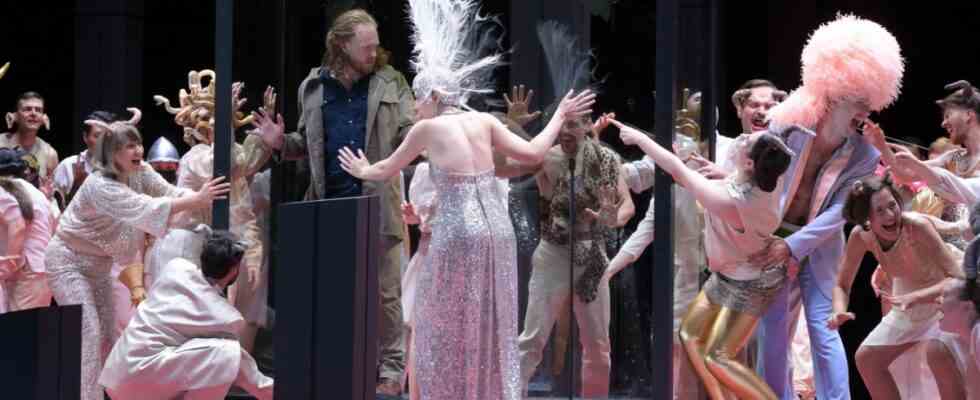“I wanted to explore good and bad in life”: This is how the title hero of Luigi Dallapiccola’s “Ulisse” introduces himself on the stage of the Frankfurt Opera, having escaped the raging sea almost naked. As in Homer’s epic, Odysseus has reached the island of the Phaeacians by swim, where he tells about his past: about Calypso and Circe’s search for love, about the Lotophages, who make people happy by teaching them to forget the past and future. But Ulisse, as he is called in the Italian world, does not want to forget, but, as the second act of the opera tells us, finds his way back to Ithaca, to his wife Penelope, even if he has to kill her countless suitors there.
Luigi Dallapiccola (1904 – 1975) is best known in Germany for his opera “Il Prigioniero”, with which he became the leading composer of a politically committed music theater in the post-war period. The fact that twenty years later the Italian took a completely different – more mythical, more philosophical – path in his last opera was unsettling not only at the premiere at the Deutsche Oper Berlin in the highly political year of 1968. To date, the work has hardly caught on on the stage, the the Frankfurt Opera now puts it up for discussion again in a German translation, as it did in Berlin.
The director Tatjana Gürbaca lets it play in an intermediate world: A kind of gloomy parking deck (stage: Klaus Grünberg) appears as a symbol of the dead world of Hades, into which Ulisse descends in the central middle scene, but also as an image of the sea, its black waves of stage workers be rolled in for the open transformations. The costumes by Silke Willrett show people of timeless presence, antique attributes such as faun squirrels at the orgy at Penelope’s court appear only occasionally. The chorus of the Frankfurt Opera, which is enormously enthusiastic about performance and at the same time sounds fabulously homogeneous, throws itself into it with relish; At the beginning, Gürbaca has an Ulisse chosen from among his ranks, who is simply anyone – or “nobody”, as he is repeatedly called in the opera.
Ulisse will not be happy, dying he will drift out to sea
This is far more than an allusion to the Homeric scene around the giant Polyphemus. In the libretto he wrote himself, Dallapiccola was concerned with the modern man who explores everything, but who has become alienated from himself in the process, who recognizes no limits and has thereby pushed himself beyond recognition, to open questions. In contrast to the epic, Penelope recognizes her “nobody” at the end without any problems, but Ulisse is not happy with her either. It drives him out to sea again, where he at least has a presentiment of God as he dies. Musically, Dallapiccola has developed his very own form of twelve-tone music, which in terms of sound itself has something exploratory and rooting about it. The conductor Francesco Lanzillotta guides the detailed playing of the Frankfurt Opera and Museum Orchestra with careful attention, does not shy away from agglomerations of sound, but above all emphasizes the flowing search.
Orgy at Penelope’s court
(Photo: Barbara Aumüller)
Perhaps the staging would have to be more enigmatic than Tatjana Gürbaca does in her sovereign, but quite solid story. “Ulisse” is not a theater work in the true sense of the word, there is a lack of dramatic involvement and the characters reflect too much on themselves. Of course, they sing more beautifully than twelve-tone composing usually allows. With an unmistakably Italian feel for the cantabile, Dallapiccola explores the possibilities of all vocal subjects. There is, for example, Katharina Magiera, who descends into the depths of Circe and Melantho with her velvety alto, the dramatically moving Claudia Mahnke, who encounters Ulisse as his dead mother in Hades, Brian Michael Moore’s palatable tenor as Eumäos or the strikingly virile Danylo Matviienko as free Antinous. Ultimately, however, they all remain episodes, while Iain MacNeil as Ulisse holds everything together with a wonderfully bronze-saturated baritone that exudes an almost tenoral warmth in the high notes. The still quite young singer not only conveys his character’s self-exegesis with striking text clarity, but also vocally ties it to flawless legato slurs.
It is part of the program policy of the Frankfurt artistic director Bernd Loebe to repeatedly present lesser-known music theater works. Dallapiccola’s “Ulisse” proves to be one that is perhaps better off in the concert hall than on the stage, but is definitely worth discussing. Because Ulisse, that nobody in search of himself, is still our contemporary.

